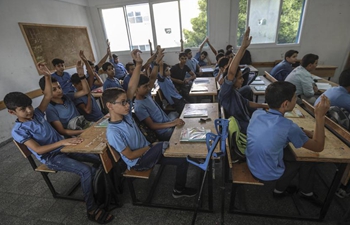BERLIN, Sept. 6 (Xinhua) -- Almost every third 30 to 34-year-old woman in Germany now holds a university degree, according to a study published on Thursday by the Federal Statistical Office (Destatis).
With 30 percent, the share of women in this generation who hold a university degree is now twice as high as for 60 to 64-year-old woman.
Among men aged 30 to 34, the share of university graduates has risen only slightly from 22 to 27 percent over the last thirty years. Across genders, 29 percent of the Germany population between 30 and 34 years graduated from a university, according to the government numbers.
Speaking to Xinhua, education expert Ulrich Kober at the Bertelsmann Foundation explains that this is mainly due to the "expansion of qualifications". Nowadays, a higher level of education would be necessary in order to participate successfully in the labor market.
According to the Bertelsmann expert, a starting point for this development towards higher educational qualifications was the results of the first "Program for International Student Assessment" (PISA) study in 2000.
"In this study, two myths about the German education system were destroyed: Firstly, that it was very well developed and secondly, that it was particularly fair," says Ulrich.
Germany did particularly poorly in this PISA test on the educational level of European pupils, ending up in 21st place with 32 participating nations.
German pupils performed below average in all tested categories such as writing and reading skills, natural sciences and mathematics. The educational system has been brought back to the public spotlight in Germany since then.
But the federal evaluation by Destatis also shows that the share of Germans with a vocational training has decreased as a result of the growing number of academics.
Ulrich, however, sees no tendency towards an excessive academization in Germany. "We cannot just look at this phenomenon in black and white."
A higher educational qualification would always be advantageous, but the vocational training was an essential component of the German labor market, especially for business sectors such as industry.













